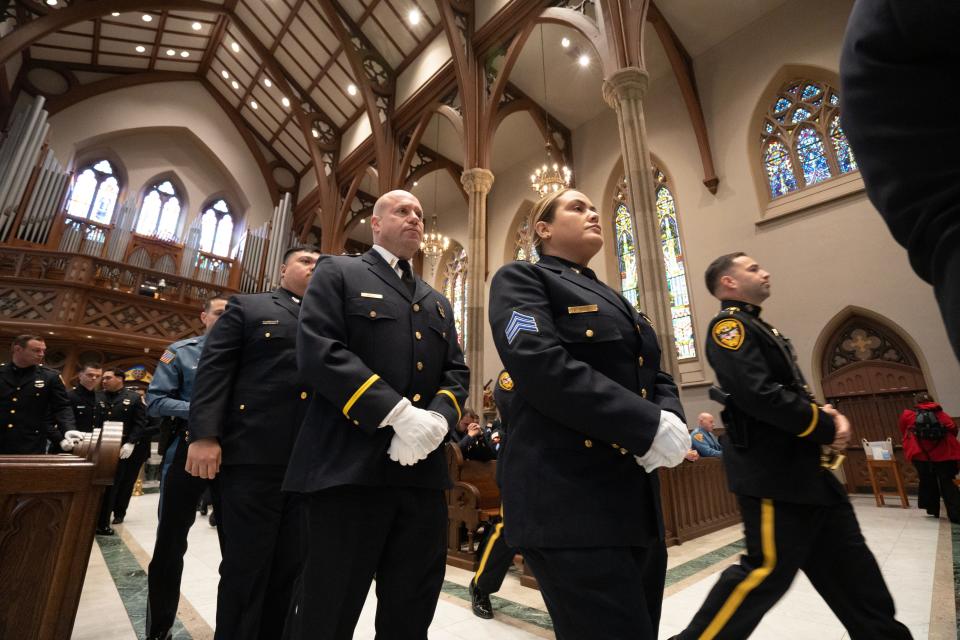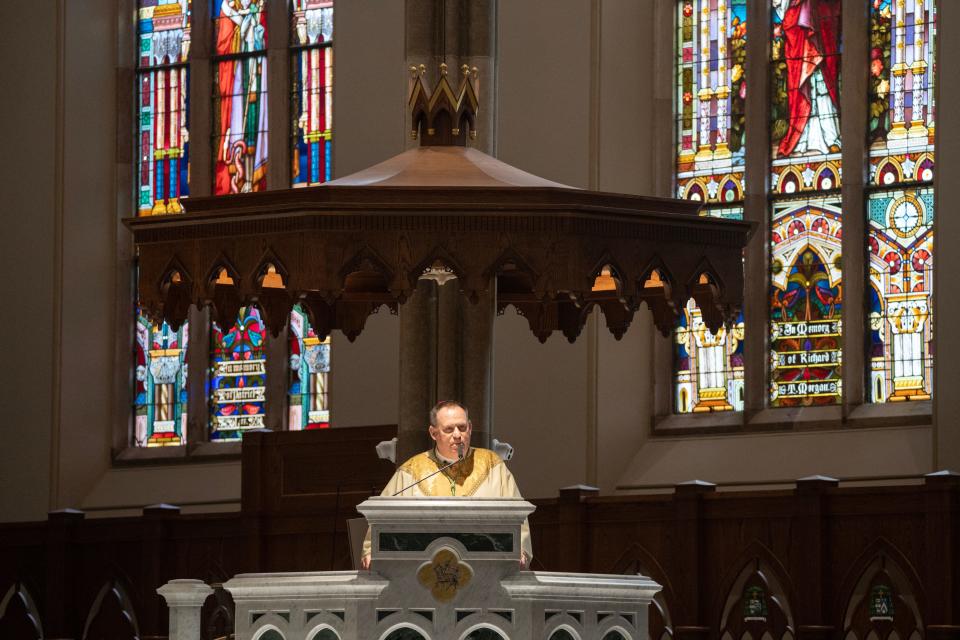Catholic burial after suicide? Sheriff Berdnik's funeral shows how church has evolved
When former Passaic County Sheriff Richard Berdnik is memorialized Wednesday at the Cathedral of St. John the Baptist in Paterson, it will be a reminder of how far the Catholic Church has come in dealing with suicide.
The longtime sheriff died of a self-inflicted gunshot wound last week after he walked into the bathroom of a Clifton restaurant. His funeral amid the vaulted ceilings and inlaid marble of the cathedral — followed by burial at St. Michael's Cemetery in South Hackensack — is an ending that might have been denied to him not so long ago, when the church treated victims of apparent suicide more harshly.
For centuries, the church's official teaching has been that taking one's life is a mortal sin, a grave action committed with full knowledge that it contravened God's will. Yet in recent decades, church leaders have developed an increasingly compassionate tone toward the act's aftermath.

The official Catechism of the Catholic Church stresses that human beings "are stewards, not owners, of the life God has entrusted to us. It is not ours to dispose of." Intentionally causing one's death is as wrong as murder, and those committing such a sin were long considered ineligible for church funeral or burial.
Yet the stance has softened, Catholic leaders said, amid a deeper understanding of depression and emotional disorders that play a role in suicide.
Suicide, which increased 3% in 2022 over the previous year, is one of the leading causes of death today in the United States. Nearly 50,000 Americans took their own lives in 2022, reported the Centers for Disease Control and Prevention.
Meanwhile, more than one in five American adults live with some kind of mental illness, the CDC says, and 29% of Americans reported having been diagnosed with depression at some point in their lifetime, in a Gallup survey released last year.
Catholic teachings on suicide
"Suicide is a human tragedy that shakes families and shatters hearts," Bishop Kevin J. Sweeney, head of the Paterson Diocese, said in an emailed statement Monday. He will offer the final commendation prayers at Berdnik's funeral Wednesday.
"While the Church has in the past forbidden Christian funerals and burials for those who take their own lives, developments in modern psychology indicate that emotional imbalance, grave suffering, or fear more often than not diminish responsibility for such a desperate decision," Sweeney said.

Visitation for the sheriff is scheduled for 3 to 8 p.m. Tuesday at the cathedral, at 381 Grand St. in Paterson. Berdnik's funeral is scheduled for Wednesday at 10 a.m. at St. John's, followed by interment at St. Michael's.
Official Catholic attitudes began to change in the 1980s with "a better understanding of and empathy towards those suffering from mental illness," said Margaret McGuinness, a professor emerita of religion and theology at La Salle University in Philadelphia.
Support, not condemnation
Catholicism is not the only religion that condemns suicide: Islam, Judaism, Buddhism and Hinduism also teach against the act of taking one's life. In recent years, each community has had to grapple with the impact of mental health disorders and rising suicide rates.
"Pity, not condemnation, is the response of the Church" Trenton Bishop David M. O’Connell wrote in a message to his diocese in September, quoting the Jesuit scholar William Byron. "Prayers are offered for the deceased. Mass is celebrated. Burial with dignity, in consecrated ground, is provided for one who dies this way."
"For those of us who remain, the Church encourages paying attention to the pain that produced the action," he counseled. "Then, look forward, not back, to pain within ourselves and pain in others, especially when we see no signs and hear no calls for help."
Times have changed enough that parishioners were shocked in 2018 when a Michigan priest offered a critical sermon for an 18-year-old who had taken his own life, in which the priest called the act “secular crime” and a “sin against God with dire eternal consequences.” The story went viral, and local Catholic officials quickly apologized.
More: Seven days shook the Passaic County Sheriff's Office: What comes after Berdnik's death?
Berdnik was 'honest as the day is long'
Father Patrick Ryan, one of the chaplains of the Passaic County Sheriff's Office, said the church has become more sensitive to issues surrounding mental illness. "We have to be there for the individual whose life has ended, as well as for the family," he said.
Ryan, who was ordained more than 40 years ago, said he couldn't recall anyone who wanted a church funeral but didn't have one. He remembered the sheriff as "a practicing Catholic, a family man and as honest as the day is long. He was a really good man. Committing suicide just doesn’t fit.”
A full Catholic funeral and burial for Berdnik follows “what Jesus would be doing for anyone in such a situation,” Ryan said. "We need to be there for that soul and that family. They have a big enough burden with the loss."
Deena Yellin covers religion for NorthJersey.com. For unlimited access to her work covering how the spiritual intersects with our daily lives, please subscribe or activate your digital account today.
Email: yellin@northjersey.com
This article originally appeared on NorthJersey.com: NJ sheriff's funeral shows Catholic Church's evolution on suicide

